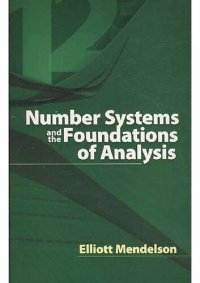
Ebook: Number Systems and the Foundations of Analysis
Author: Elliott Mendelson
- Genre: Mathematics // Analysis
- Tags: Calculus Number Systems
- Series: Dover Books on Mathematics
- Year: 2009
- Publisher: Dover Publications Inc.
- Language: English
- pdf
This is a textbook on the construction of the real numbers, aimed at students with no experience in proofs. It is a wide-ranging work, not only constructing the numbers but placing them in the context of more general algebraic structures and developing some topology of the real line. It has some discussion of continuous functions, convergence, and infinite series. It leads off with a lengthy section on logic, set theory, and functions.
The book has a clever approach to the negative numbers (p. 87), avoiding a lot of the tedious special-casing that these usually require: after having created the positive integers, the book defines the integers as equivalence classes of ordered pairs of positive integers, where all the pairs (a, b) with the same value of a – b form a class. Apart from this the book is fairly conventional in its approach. It uses Cauchy sequences to develop the reals, but gives Dedekind cuts in an appendix.
This book is nearly three times as long as Landau’s classic Foundations of Analysis, but it is not a flabby book. The added length comes partly because it covers a wider range of topics (Landau focuses single-mindedly on constructing the complex numbers from the Peano postulates) and because it has many exercises and examples (Landau has none).
One concern I have with the book is that it may be too wide-ranging; it’s hard to imagine any single college class or any reader who would want to study all these things at the same time. Another concern is that it takes a long time to get to the nominal subject of the book, number systems; by page 156 we have only developed the integers. That being said, it is well-written and a nice treatment of the subject, and has a bargain price.
The book has a clever approach to the negative numbers (p. 87), avoiding a lot of the tedious special-casing that these usually require: after having created the positive integers, the book defines the integers as equivalence classes of ordered pairs of positive integers, where all the pairs (a, b) with the same value of a – b form a class. Apart from this the book is fairly conventional in its approach. It uses Cauchy sequences to develop the reals, but gives Dedekind cuts in an appendix.
This book is nearly three times as long as Landau’s classic Foundations of Analysis, but it is not a flabby book. The added length comes partly because it covers a wider range of topics (Landau focuses single-mindedly on constructing the complex numbers from the Peano postulates) and because it has many exercises and examples (Landau has none).
One concern I have with the book is that it may be too wide-ranging; it’s hard to imagine any single college class or any reader who would want to study all these things at the same time. Another concern is that it takes a long time to get to the nominal subject of the book, number systems; by page 156 we have only developed the integers. That being said, it is well-written and a nice treatment of the subject, and has a bargain price.
Download the book Number Systems and the Foundations of Analysis for free or read online
Continue reading on any device:

Last viewed books
Related books
{related-news}
Comments (0)